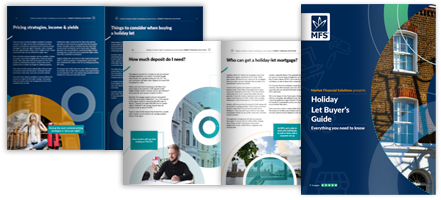Disclaimer
Market Financial Solutions are a bridging loan and buy-to-let mortgage provider, not financial advisors. Therefore, Investors are encouraged to seek professional advice. The information in this content is correct at time of writing.

Whether an investor needs planning permission for holiday let investments will depend on a number of factors. Planning permission requirements can be complicated, and changes to the planning system are on their way.
But, determining whether planning permission is needed at all is relatively straightforward. If an investor knows they’ll likely need planning permission down the line, they can prepare ahead of time, or seek out expert guidance for the process.
Currently, there are three main circumstances where planning permission for holiday let assets and other properties will likely be needed. Although, new holiday let planning restrictions will likely be introduced in mere months.
When is planning permission for holiday let properties needed?
Generally, property investors and homeowners will likely need planning permission if they want to build something new, make a major change to a building such as adding an extension, or change the use of a building[1]. This is the case in both England and Wales.
Certain property investment projects may not require planning permission due to permitted development rights[2]. These are national grants which allow certain building works and changes of use to be carried out without having to make a planning application. Common projects that usually have permitted development rights include demolitions, and investments in industrial premises or warehouses.
So, for holiday lets, permitted development rights may allow the conversion of agricultural assets (such as a barn) into residential property without the need for planning permission[3]. But, planning permission may be needed if an investor plans to let a home for the first time, convert certain buildings, or build a property on unused land.
To find out if a project will need planning permission, local planning authorities (LPA) should be contacted via local councils. The government has tools on its website that allow users to find their local council’s details[4].
Planning permission for holiday lets – changes are coming
From summer 2024, new planning permission rules will be in place in England. Permission from a local authority will be required where a property is to be let on a short-term basis or as a holiday home, for more than 90 nights a year[5].
A new planning “use class” will be created for short-term lets that are not used as a main home[6]. This C5 use class will also force existing holiday lets to be reclassified into this new category, although fresh planning applications won’t be required.
Also, new “associated permitted development rights” are on the way. Firstly, short-term lets can be changed to a standard residential property. Secondly, a property to be changed to a short-term let. What’s important to note is that the new rules will allow local authorities to remove these permissions and require full planning permission where it’s deemed necessary.
A mandatory national register will be set up, allowing local authorities to keep an eye the on short-term lets in their area, monitor their use, assess the impact on the local market, and ensure health and safety rules are being followed.
These new rules and requirements are being introduced in an attempt to amend apparent challenges in certain local markets. In certain staycation hotspots, investment in holiday lets and Airbnb properties has, arguably, restricted access to long-term residential options. Locals in places such as Cornwall[7] lament that they have been priced out of their own towns as a result of a holiday let boom.
As the state continues to try and amend housing issues, property investors should keep an eye on what potential changes could mean for them. Especially with a general election looming[8], which will likely result in a new government[9].

How to get planning permission for holiday let investments
The majority of planning and building control applications are submitted online. In England and Wales, it’s possible to apply to every local authority using the Planning Portal[10], a website specifically set up for submitting planning applications and finding guidance.
There is an online application form that needs to be filled in but along with this, details on the following may also need to be submitted[11]:
- Location plan
- Site plan
- Elevations of both the existing and the proposed designs
- An ownership certificate
- A design and access statement
- An “Agricultural Holdings Certificate”
- The correct fee
There will be different costs involved, which are varied by location and type of project. They can range between £230 and £578 across England and Wales.
Generally, it may take around eight weeks for the planning permission process to complete, but more complex cases may take longer. Also, anyone involved in an investment can make a planning application.
It doesn’t matter if they own the land or buildings involved[12]. In many cases, a planning agent, builder, architect, or other qualified professional can make the application on behalf of the underlying investor/owner.
The government encourages applications to be submitted online, but where this isn’t possible, details can be submitted to a local planning authority in hard copy, or electronically (eg on a CD or USB[13]).
How to get finance for holiday lets
What investors need to remember, is that Market Financial Solutions can provide funding for a range of holiday let strategies that may, or may not require planning permission. Our permitted and light development loans can be put towards many property investments and upgrades, from basic cosmetic changes, through to substantial conversions that need approval.
Also, our underwriters are there for brokers and borrowers from day one of their enquiries. With 18 years of experience and lending precedence behind them, they’re able to adapt to any planning permission complication that may emerge. For any investor out there who may be worried about holiday let planning restrictions, we’re here to help.
The Complete Guide to
Holiday Lets
Everything you need to know
- What to consider
- Costs, pricing, income
- Rules & regulations
- Finance options
[1] https://www.gov.uk/planning-permission-england-wales
[2] https://www.gov.uk/guidance/when-is-permission-required#What-are-permitted-development-rights
[3] https://www.helpfulholidays.co.uk/blog/does-holiday-letting-require-planning-permission/
[4] https://www.gov.uk/find-local-council
[5] https://www.osborneclarke.com/insights/short-term-lets-england-required-obtain-planning-permission-summer
[6] https://www.financialreporter.co.uk/government-announces-planning-changes-and-registration-scheme-for-holiday-lets.html
[7] https://www.cornwalllive.com/news/cornwall-news/st-ives-many-second-homes-9035003
[8] https://www.bbc.co.uk/news/uk-politics-68612041
[9] https://www.ipsos.com/en-uk/labour-lead-economy-and-public-services-conservative-share-falls-record-low
[10] https://www.planningportal.co.uk/applications
[11] https://www.fmb.org.uk/find-a-builder/ultimate-guides-to-home-renovation/planning-permission.html
[12] https://www.royalgreenwich.gov.uk/info/200193/planning_applications_and_permissions/20/apply_for_planning_permission#:~:text=Anyone%20can%20make%20a%20planning,architect%20to%20apply%20for%20you.
[13] https://www.gov.uk/guidance/making-an-application#Application-form





